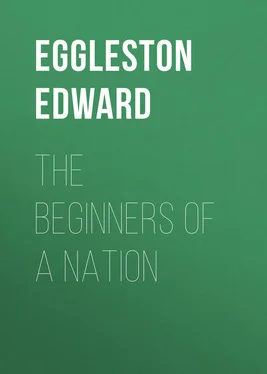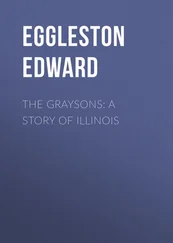Edward Eggleston - The Beginners of a Nation
Здесь есть возможность читать онлайн «Edward Eggleston - The Beginners of a Nation» — ознакомительный отрывок электронной книги совершенно бесплатно, а после прочтения отрывка купить полную версию. В некоторых случаях можно слушать аудио, скачать через торрент в формате fb2 и присутствует краткое содержание. Жанр: История, foreign_antique, foreign_prose, на английском языке. Описание произведения, (предисловие) а так же отзывы посетителей доступны на портале библиотеки ЛибКат.
- Название:The Beginners of a Nation
- Автор:
- Жанр:
- Год:неизвестен
- ISBN:нет данных
- Рейтинг книги:4 / 5. Голосов: 1
-
Избранное:Добавить в избранное
- Отзывы:
-
Ваша оценка:
- 80
- 1
- 2
- 3
- 4
- 5
The Beginners of a Nation: краткое содержание, описание и аннотация
Предлагаем к чтению аннотацию, описание, краткое содержание или предисловие (зависит от того, что написал сам автор книги «The Beginners of a Nation»). Если вы не нашли необходимую информацию о книге — напишите в комментариях, мы постараемся отыскать её.
The Beginners of a Nation — читать онлайн ознакомительный отрывок
Ниже представлен текст книги, разбитый по страницам. Система сохранения места последней прочитанной страницы, позволяет с удобством читать онлайн бесплатно книгу «The Beginners of a Nation», без необходимости каждый раз заново искать на чём Вы остановились. Поставьте закладку, и сможете в любой момент перейти на страницу, на которой закончили чтение.
Интервал:
Закладка:
Hening ii, 242. By 1666 the silk delusion had passed, and the Virginia Assembly repealed all acts for the encouragement of mulberry trees. Ten years later, Glover, the botanist, found many of these trees still standing as melancholy witnesses to the waste of energy by the earlier promoters and settlers of the colony. Phil. Trans. XI, 628. Almost every other American colony made the same experiment for itself, and Virginia renewed its endeavors from time to time, each generation forgetting what its fathers had learned.
III
Silk-grass. Along with the silk fever went the silk-grass craze. 1585. Ralegh's people had seen the Indians wearing garments woven of the fiber of the Yucca filamentosa , the "Adam's needle and thread" of our popular speech. A Briefe and True Report of the New Found Land of Virginia. Hariot, in his account of it, declares that "the like grows in Persia," and that much of the "silk-works" coming thence to Europe was made of this fiber. He probably confounded the yucca with the ramie plant of the East, of which grass cloth is made. Of the yucca fiber taken to England in 1585, "a piece of silk grogram" was made, and of course pronounced "excellent good"; it was even presented to the queen. The coarse and rather brittle fiber of this plant was exalted by enthusiasts into something nearly equal to silk. Ordinances for planting it were sent from England; at least one legislative act in its favor was passed by the Virginia Assembly, and the most foolish hopes were entertained regarding the profit to be had from it. Proceedings of Va. Assembly, 1619. 2d N. Y. Hist. Society Coll. iii, 348. By 1619 it had come to be called "silk flax," and it was then advocated for homelier uses, such as cordage and linen, and every householder was compelled by law to set a hundred plants; the governor himself set five thousand. In 1624 it is spoken of as "a commoditie of speciall hope and much use." Purchas IV, p. 1777. There were by this time those who ventured to say that the silk-grass enterprise was "full of difficultie"; but the managers in England easily got rid of this objection by attributing the difficulty to "negligence and want of experience." Instr. of 24 July, 1624. MS. Bk. of Instr. Libr. of Cong. They were just then intent on finding some commodity that would take the place of tobacco, which was frowned upon by both court and Parliament. In spite of all discouragement, the hope of good results from the yucca fiber outlasted that generation, and was in full vigor in 1649, sixty-four years after Hariot's mistake.
IV
Wine. It was also proposed to produce wine in Virginia for English consumption. No more gold and silver should go out of the realm to buy port and canary to the profit of foreigners and the impoverishment of the good and loyal subjects of his Majesty. The instructions on this point were clear, and before the Virginia exiles had secured bread to stay their hunger they had made wine of the sour wild grapes of the country. French vine-dressers were sent over a little later and were forbidden to plant tobacco, but were compelled to employ themselves about vines, with the care of silkworms for variety. MS. Rec. Va. Co. i, 343. In 1621 these Frenchmen sent to England a cask of wine, the arrival of which was duly celebrated. Other experimental casks of wine were afterward sent to England from America at long intervals, but without decreasing the profits of wine growers in the Old World.
All the commodities sought from Virginia were unsuited to conditions in a new country. Other products sought. To the folly of making such experiments at all where living itself was an experiment, the managers added the folly of crowding a multiplicity of problematic enterprises on the colony at the same time. With a virgin continent in which to produce novelties, all things seemed possible in an age so hopeful. Plants of every clime grew rank in the imagination of projectors. Virginia was a wonderland, and it was readily believed without evidence that the "soyle and clymate" were "very apt and fit for sugar canes"; "also linseed and rapeseeds to make oiles," as a black-letter pamphlet of 1609 expresses it. Nova Brittania. Along with "orenges, limons, and almonds," this official writer proposes to plant "anniseeds, rice, cummin, cottonwool, carroway seeds, ginger, madder, olives, oris, sumacke," and, as if this breathless list were not enough for one new land, he adds, "and many such like that I can not now name." If we may trust the publications of the company, various West India plants were tried in the very first days of the colony, while the threefold peril of death from famine, pestilence, and savage war was imminent.
Timber and naval stores. But it was not enough to wring from an infant colony the products of the south; those derived from the north of Europe were straightway to be got there also. MS. Rec. Va. Co. 31 May and 23 June, 1620. German millwrights – "Dutch carpenters," in the phrase of the records – were brought from Hamburg by John Ferrar to build Virginia sawmills; timber was still sawed by hand in England. Pitch, tar, and potash were to be produced by Poles sent out for the purpose in the second year of the colony. Patriotism dictated that England should be relieved of her dependence on foreign countries for naval stores. Virginia had forests: why should she not produce these things? 28
It had been found that the savages eagerly received glass beads in exchange for corn and peltries. Glass-making. Nothing more was required to prove the profitableness of glass-making. Some Germans were sent to the colony in 1608, and glass works were established. 29For some reason no proper materials were available at first, and it became necessary to request that sand might be sent from England to make Virginia glass of at the glass works in the woods near Jamestown. The German glass blowers were prone to run away to the Indians, among whom work was lighter and food more abundant. The tribesmen encouraged these desertions by providing dusky wives for the men whose skill with tools and weapons they valued highly. In 1621 the glass business was revived, and this time it was intrusted to Italian workmen. Iron works. About the same time iron works were established at Falling Creek, with "forty skilled workmen from Sussex to carry them forward." 30Twenty-five ship carpenters were sent to ply their trade on the James River, and it was also arranged that oil was to be distilled from walnuts by the "apothecaries." George Sandys was sent over in July, 1621, to have entire control of all schemes for staple commodities. There was a certain fitness in intrusting these creatures of the imagination to a poet. Pineapples, plantains, and other fruits were to be started forthwith. There was once again great hope from the "rich commodity of silk," an endowed school for Indians was founded, and the little Virginia pool became iridescent with many frail bubbles. Result of the massacre. The sudden and frightful massacre by the savages in March, 1622, obliterated instantly all vain and premature projects. This calamity did not cause the failure of these foredoomed schemes; it only saved them from a painful and lingering death, and provided their friends with a decent epitaph for them. The people who survived the massacre were decimated by an epidemic in the following year. What strength they could spare from frequent battles with the savages they spent in growing corn and tobacco, which last, of all the things tried, proved to be the only commodity profitable for export.
V
Tobacco. Against tobacco King James had written a book. A Covnter-Blaste to Tobacco, 1604. It was denounced in Parliament and regarded by all public-spirited men as an evil. Nevertheless, it turned the scale and saved the colony. In colony-planting the problem is fundamentally an economic one, and economic problems are solved by coarse and homely means. 31John Rolfe, the first Englishman that ventured to wed an Indian, planted the first tobacco at Jamestown in 1612, and by 1616 the better West India variety had perhaps been substituted for the harsh kind grown by the Virginia Indians, and by them called "uppowoc" or "apooke." Tobacco prospered and was profitable, to the disgust of the pedantic king and the sorrow of all who had cherished hopes of beautiful products from a colony upon which so much poetic sentiment had been lavished. Neither gold nor spices came as had been expected; the strings of pearls seen by Ralegh's men were not again to be found, or were perhaps transformed on investigation into wampum beads; the silver mine once discovered on the upper James had vanished forever; tropical fruits refused to grow; even madder and woad failed, and, though the indigo plant would readily mature, nobody knew how to manufacture the dye. Silk was troublesome and unprofitable, shipbuilding, and such coarse but patriotic products as naval stores had come to naught. But the detestable "weed," as King James had dubbed it, throve apace. As early as 1617 the waste margins of the broad streets of Jamestown were planted with it by the eager settlers. The English merchants grasped at the profits of it, the farmers of the customs rejoiced in the heavy duties imposed on it, and a powerful mercenary interest in the prosperity of Virginia was established. 32By 1624, when the Virginia Company was dissolved, the danger that the colony would be abandoned as a result of Spanish intrigues, Indian massacres, or prolonged discouragement had passed away. Public spirit, patriotism, and religious enthusiasm no longer guarded it as a feeble house plant. It had struck root in the outdoor soil of human self-interest and its life was assured. From that time the colony that had been for seventeen years a fairyland to dreamers in England and a perdition to its inhabitants, became a sober money-making enterprise, uninteresting to enthusiasts and philanthropists. 33
Читать дальшеИнтервал:
Закладка:
Похожие книги на «The Beginners of a Nation»
Представляем Вашему вниманию похожие книги на «The Beginners of a Nation» списком для выбора. Мы отобрали схожую по названию и смыслу литературу в надежде предоставить читателям больше вариантов отыскать новые, интересные, ещё непрочитанные произведения.
Обсуждение, отзывы о книге «The Beginners of a Nation» и просто собственные мнения читателей. Оставьте ваши комментарии, напишите, что Вы думаете о произведении, его смысле или главных героях. Укажите что конкретно понравилось, а что нет, и почему Вы так считаете.












